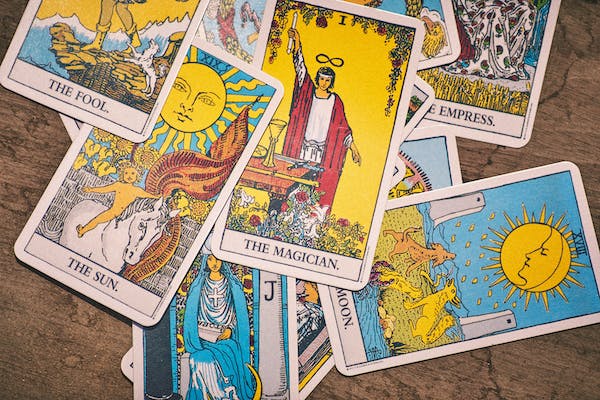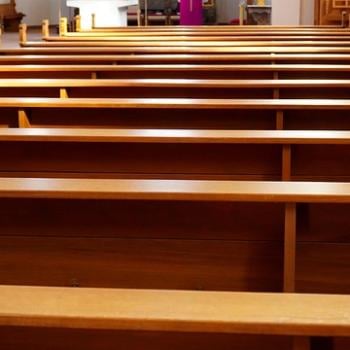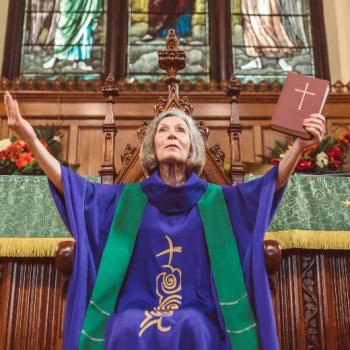
THE RELIGION GUY’S ANSWER:
If you think this topic is off the wall, at least it’s not off the news. Tarot for Christians is promoted by the May cover story in The Christian Century, a venerable independent magazine that helps define what’s trendy and acceptable for “Mainline” and liberal Protestant readers. See www.christiancentury.org/article/features/woman-behind-tarot-s-strange-beauty/
The article’s author is the monthly’s own Associate Editor Jessica Mesman, who also co-founded the Sick Pilgrim blog aimed at “people who questioned EVERYTHING.” Her self-described social circle consists of fellow “lapsed Catholics” along with “exvangelicals, and other ‘deconstructing’ Christians” who seek to fill the vacuum left by their prior religious “narrative threads.”
For the uninitiated: Tarot cards consist of a deck numbering 78, with 22 to symbolize “Major Arcana” or life events, and 56 “Minor Arcana” that cover everyday occurrences. Some devotees may claim the practice is rooted in ancient Egyptian magic. But conventional history says Tarot originated as an entertaining card game in 15th Century Italy that later merged into the occult movement’s quest for liberating answers through access to hidden wisdom. Tarot was newly popularized as a “New Age” spiritual practice in America’s 1960s counterculture and the “Neo-Pagan” movement.
How and why it’s done
A Tarot card reader, whether a paid professional or the individual, turns over Tarot cards and reflects by intuition on what the images say. Often this is divination or “fortune telling,” believed to provide information and guidance about the future. But as with Christian writers like Brittany Muller, Mesman’s own practice reflects on the cards’ images as “a tool for self-directed spiritual contemplation,” rather like Enneagrams or the Myers-Briggs self-assessment questionnaire.
“There doesn’t have to be any magic involved – not in the sense of manipulation of supernatural power,” she explains. “I want more than anything to believe, but I am never quite convinced, so I go on searching for answers that I suspect I already know but cannot accept.”
A Tarot blogger who goes only by the first name of Miriam explains that though people often associate the practice with paganism, and pagans do in fact favor it, Tarot can provide insight to followers of any faith. By coincidence, the Century issue appears simultaneously with Commentary magazine’s May cover story titled “The Return of Paganism,” which decries a contemporary American “spiritual crisis” but does not explore actual pagan religious groups.
Then there’s the Bible
The Century’s coverage does not explore the thousands of years in which Christianity, and Judaism before it, have together drawn a sharp line against divination and other occult practices. A primary text in the Jewish Bible (Christians’ Old Testament) is Leviticus 19:26: “You shall not practice divination or soothsaying,” followed by verse 31: “Do not turn to ghosts and do not inquire of familiar spirits, to be defiled by them.”
Deuteronomy 18:9-13 associates “abhorrent” practices like child sacrifice with divination, readings from animal entrails or bird flights, spell-casting, inquiries to the dead and other forms of sorcery. Other biblical references to such pagan practices are found in Numbers, Joshua, Judges, 1 and 2 Samuel, 1 and 2 Kings, Isaiah, Jeremiah, Ezekiel, Zechariah and Micah.
For Judaism, divination and magic that invoke occult powers “are objectionable because they seek to circumvent God,” according to the Conservative branch’s “Etz Hayim” Bible commentary. Reform Judaism’s “The Torah: A Modern Commentary” observes that “there will always be those who will attempt to enhance their power and knowledge by resorting to putative forces not subject to the revealed will of God or ordinary laws of nature.”
A February blog item by Whitney Hopler of George Mason University’s Center for the Advancement of Well-Being — see www.crosswalk.com/faith/bible-study/what-does-the-bible-say-about-tarot-cards.html/ — urges fellow Christians to shun Tarot cards hoping for “more information about themselves and their futures” by uncovering hidden knowledge. Instead, she recommends “knowing ourselves” in relationship with God through prayer and Scripture. For her, “our lives are not in the cards; they are in God’s hands.”
Similarly, Catholic columnist Adam Blai at catholic-link.org says to consult Tarot is “to tell God you do not trust his word or his providence in your life,” creating an “idol” that receives reverence and thus violates the first of the Ten Commandments.
A final twist
The semi-Catholic writer Mesman conveys special praise for eccentric British illustrator Pamela Colman Smith (1878-1951), said to be a heroine “in occult and feminist circles.” Her imaginative designs appear on the most popular version of Tarot cards first marketed in 1909. The publisher gave her little money and no credit. Though immersed in occult society and its Hermetic Order of the Golden Dawn, some 18 months after completing her best-known artistic achievement Smith converted to Catholicism. She spent the later years of her life as the custodian of a tiny Catholic chapel and caregiver for a group of aging priests. . .













